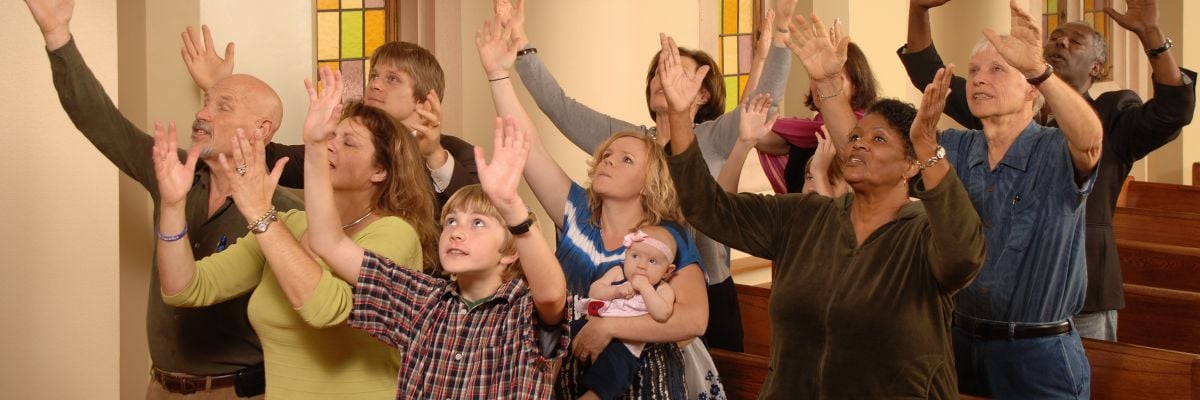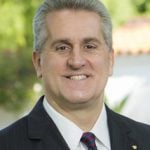
Catholic Answers Director of Apologetics Tim Staples explains what the Catholic Church teaches about speaking in tongues.
Host: All right, 24 after the hour, Tim Staples is here answering your questions. Let’s go to Ardmore, Oklahoma, to Jack listening on iCatholic Radio app. Hello Jack.
Caller: Hey. Thanks for taking my call, guys.
Host: Welcome.
Caller: Thanks. Tim, if I understand it right, at one time you were an Assembly of God pastor, is that correct?
Tim: Yes I was, I was Holy Ghost-filled, preaching the Gospel, anywhere they’d let me, and you could hardly shut me up. But yes, sir.
Caller: All right, great. I’m an Assembly of God deacon. I’m…I don’t know, really strongly drawn towards the Catholic Church, but the only hang-ups that I have would be with what I would consider the baptism in the Holy Spirit. You know, I know a lot of times it’s speaking in tongues and things, really is misused in the Church, I’ll admit that, no problem at all. But sometimes it just kind of seems like the Catholics that I’ve talked to, that they’re very hostile towards what I would call–or what I think some Catholics would call– the charismatic gifts. Is that something that maybe was a hindrance to you? I mean, it really is with me, and I just kind of need…I don’t know…you know what I’m getting at, you know where I’m coming from.
Tim: Oh, absolutely, and I can tell you, that was an important issue to me when I was coming over into the Catholic Church. And what helped me was to realize that, first of all, if you look at the Catechism of the Catholic Church, the gift of tongues, just to use it, is mentioned in four different sections of the Catechism. And let me–you know, it talks about, in paragraph 696, referring to the form of “tongues as of fire” that fell on the the Apostles; in paragraph 2003 it says, “Whatever their character–sometimes it is extraordinary, such as the gift of miracles or of tongues–charisms are oriented toward sanctifying grace and are intended for the faithful.” So the Catholic Church is friendly toward all of the gifts of the Holy Spirit as we see them taught in the New Testament. That was important to me, especially early on, in my movement toward the Church.
As I began to study deeper, I discovered that there is a wide array of belief among Catholics when it comes to tongues. You have some, you have even fathers of the Church, that taught that tongues were not for today, but it was a first-century manifestation; sort of, you know, an anti-type to the Tower of Babel in Genesis, you know, you have that. But you also have those, and probably the majority, who believe tongues is still a valid gift. But as Catholics, the Church welcomes all. We say, “This is something that’s not been infallibly defined by the Church,” and so we have a charismatic movement in the Catholic Church–
Host: Strong papal endorsement.
Tim: With papal endorsement, where the gift of tongues is exercised. Now, sometimes, is it not really the gift of tongues? I would argue yes. Just as, you know brother, sometimes tongues are abused in Protestant circles, well sometimes they’re abused in Catholic circles as well. But I really studied it, and I got Thomas Aquinas on it, I got Saint Augustine on it, and it really gave me a broader perspective on what Christians believe; and it also gave me perspective on what’s most important, and that is charity, that is love, as you know St. Paul says in 1 Corinthians chapter 12 and 13, that the greatest of all is charity. And it really…the Catholic faith brought me what I believe to be balance in my life, to where I saw the seven sacraments, the Trinity, the great mysteries of the faith far transcend this, that is not something that’s been defined by the Church.
And so whether you’re a charismatic, hey, come in the Church, get involved in the charismatic movement; if you’re an evangelical who doesn’t believe tongues are for today, hey, come on in the Church, we got folks for you. You know, it’s an area where there is freedom in the Church.
Caller: What book would you recommend?
Tim: A book? I–you know, I don’t have a book on that that I would recommend right now.
Host: One comes to mind, it’s one of the first, I would say first wave of Catholic charismatic leadership, his name’s Father Edward O’Connor, it’s called “Catholic Pentecostalism.” Written in the early seventies, I think it’s a Notre Dame Press book. Father O’Connor, “Catholic Pentecostalism.” Ralph Martin, to me, is one of the–he would laugh if I called him the grandfather of the movement, but Ralph is a very talented, I think he has kind of a prophetic gift as a writer. Jack, his book “Hungry for God,” big impact on me; “Unless the Lord Build A House” is another book; “Crisis of Truth,” from 1982; his latest book is just a marvelous companion on prayer, it’s called “The Fulfillment of All Desire,” and he studies the top four doctors of the Catholic Church and the biblical roots of their teaching on what it means to become holy.
Tim: He gave me that book, and wow. You’re right, I mean this guy–it is a thick book but it’s one that’s really easy to read.
Host: Yeah, he combines kind of a light spirit with heavy content. It’s hard to describe.
Tim: Yeah. Anyway, that should get you started, Jack, but, you know, check it from one Pentecostal to another, that in the Catholic Church all gifts of the Spirit are welcome; plus you have the beauty of having the Magisterium that can correct you when you get out of bounds.
Caller: As long as they’re in proper order, yeah.
Tim: Exactly. As you know. You remind me, there, of 1 Corinthians 14, you know, when St. Paul was struggling a bit with the Corinthians over this very issue of tongues and prophecy in particular he emphasizes; but one thing that St. Paul emphasizes is, in verse 37 and 38, as I recall, in 1 Corinthians 14, he says, “If any man think himself to be spiritual or a prophet, let him know that he must be subject to us.” And I’m not getting this word-for-word here, but he says, “If anyone does not, then then he is not accepted;” he is not approved, let’s put it that way.
And so we always remember that the spirits of the prophets, as Paul says again in 1 Corinthians 14, the spirits of the prophets are subject to the Prophet, there’s no such thing as this uncontrollable, “I gotta speak in tongues!” sort of thing, no, that that is not of God. But you must do all things decently and in order and in submission to the authority of the Church. That was Paul’s main point there in 1 Corinthians 14.
Host: So we believe in plurality, not pluralism, huh?
Tim: Yeah, there you go.
For more on speaking in tongues, see Jimmy Akin’s article and video on the topic.



